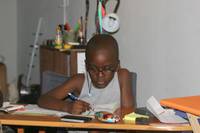
Thematic lead: Dr Modupe Adefeso-Olateju
Co-lead: Zima Ezioma Akabike and Josephine Allen
Peer Reviewer: Dr Prabhakaran Kumar and IEWD/UNCR Working Group (TBC)
Lead Organisation: The Education Centre (TEP), Nigeria
Within recent months, there is a warranted focus on educational instruction framed within the context of the COVID-19 pandemic. The abrupt movement from traditional classroom discourse to remote learning has presented issues of varying magnitude across demographics. This paradigm shift, in an effort to limit the spread of the highly infectious disease, has highlighted the need for the innovation and flexibility of curricula for non-traditional learning, customized pedagogical provisions and support for teachers/parent turned teachers as well as the consideration of learning pathways for marginalised learners amidst this international emergency.
A pandemic, as defined by The World Health Organization (2020) is the worldwide spread of a new disease, while an emergency defines a state that demands decisions and follow up in terms of extraordinary measures. These decisions are required when critical situations like the ongoing pandemic occur. Governments and education institutions have responded to the fallouts in education by employing various on-line and off-line learning methodologies while simultaneously advocating for the training of educators and education innovators in the skills and processes necessary to ensure as best as possible equitable and quality access to continued education (United Nations Educational, Scientific and Cultural Organization(UNESCO),2020). Notwithstanding, we recognise some challenges may threaten to impede the effectiveness of these mitigation strategies. The COVID-19 pandemic has undoubtedly disrupted the traditional structure of education systems and learning process. Completing the existing curricula as-is, and utilizing various pedagogical provisions carrying out assessments for differential learning may differ according to unique circumstances and environments of both educators and learners.
This paper will help identify gaps in the education system and its preparedness for continuity in times of a pandemic. It will also magnify and offer recommendations in the key areas of focus for curricula and pedagogy assessment and accelerated learning processes that feed into continuity and realistic solutions for education in emergencies.
*Picture courtesy of The Commonwealth Secretariat